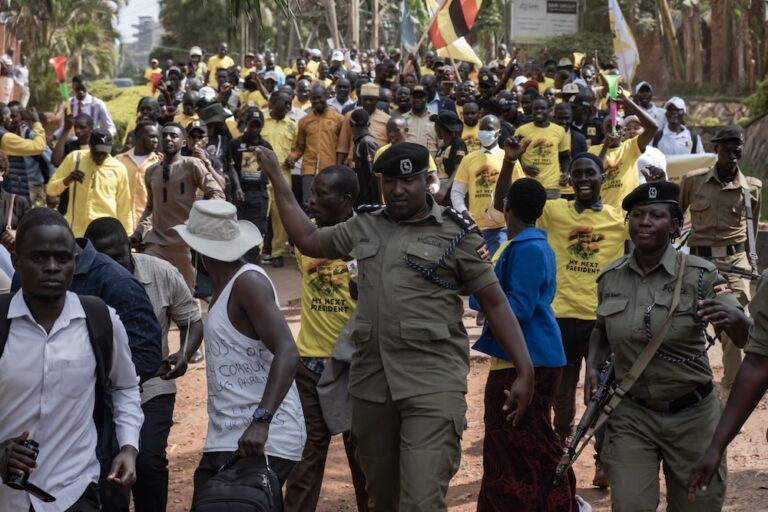On 6 August 2013, the Ugandan Parliament passed the Public Order Management Bill, which criminalizes public meetings and human rights activities.
On 6 August 2013, in less than two minutes, the Ugandan Parliament passed a controversial law – the Public Order Management (POM) Bill, which criminalizes public meetings and human rights activities. Under the law, anyone seeking to hold a meeting, public rally and demonstration must now, under Clauses 7 and 8, first obtain police permission. The ruling National Resistance Movement has the majority of members in Parliament.
The bill contravenes the Constitutional Court ruling which declares police powers to determine who, when and where to hold public rallies unconstitutional, null and void in the Muwanga Kivumbi v. Attorney General (Constitutional Petition No. 9/2005).
A number of civil society organisations say this is an infringement on fundamental rights and freedoms. “By legislating to control public assemblies or meetings rather than regulate them in accordance with the needs of a democratic society, and focused on the efficacy of government and its agencies and political organs, this bill infringes on the constitutional right to freedom of speech and expression, thought and belief, assembly, association and demonstration,” reads a joint statement from civil society organizations dated August 06.
The leader of the opposition in Parliament, Nandala Mafabi, called for an international travel ban for Deputy Speaker Oulanyah, who chaired the Parliamentary session. “Speaker Oulanyah has acted as a mercenary to pass a law which is good for tyrants, called the public order management bill… It’s only good for dictators, not for a democratic country. Oulanyah is a disgrace and we are calling upon all people to reject him. We are appealing to the international community to extend a travel ban on Oulanyah,” Mafabi told journalists at Parliament.
The bill was tabled amidst controversy following two Order Papers on the floor. One Order Paper did not include the bill on the day’s agenda, and was given to some opposition MPs. The other Order Paper included the bill on the agenda used by the speaker. This violated rule 26 of the House Rules of Procedure, which states that any change in the Order Paper has to be communicated three hours before the sitting of the House.
Efforts by the opposition to block the bill did not deter Oulanyah from proceeding with it. “Honourable Members, I put the question that the bill entitled the Public Order Management Bill do pass. May those in favour say aye, to the contrary nay,” he put the question. In less than two minutes, the bill passed. The opposition MPs protested the outcome, they stood up and surrounded the Speaker’s table, and tried several times to grab the mace, but the Sergeant-at-Arms protected it.
The police force has, on several occasions violently dispersed peaceful demonstrations and assemblies by the opposition, leaving some arrested and, or charged in court.
“This legislation spells doom [for] fundamental human rights and freedoms, especially freedom of speech and expression, expected of a democratic society. The government must desist from crushing citizens’ rights to free speech and peaceful demonstration as enshrined in the Constitution and other regional as well as international laws,” said HRNJ-Uganda’s National Coordinator, Geoffrey Wokulira Ssebaggala.



